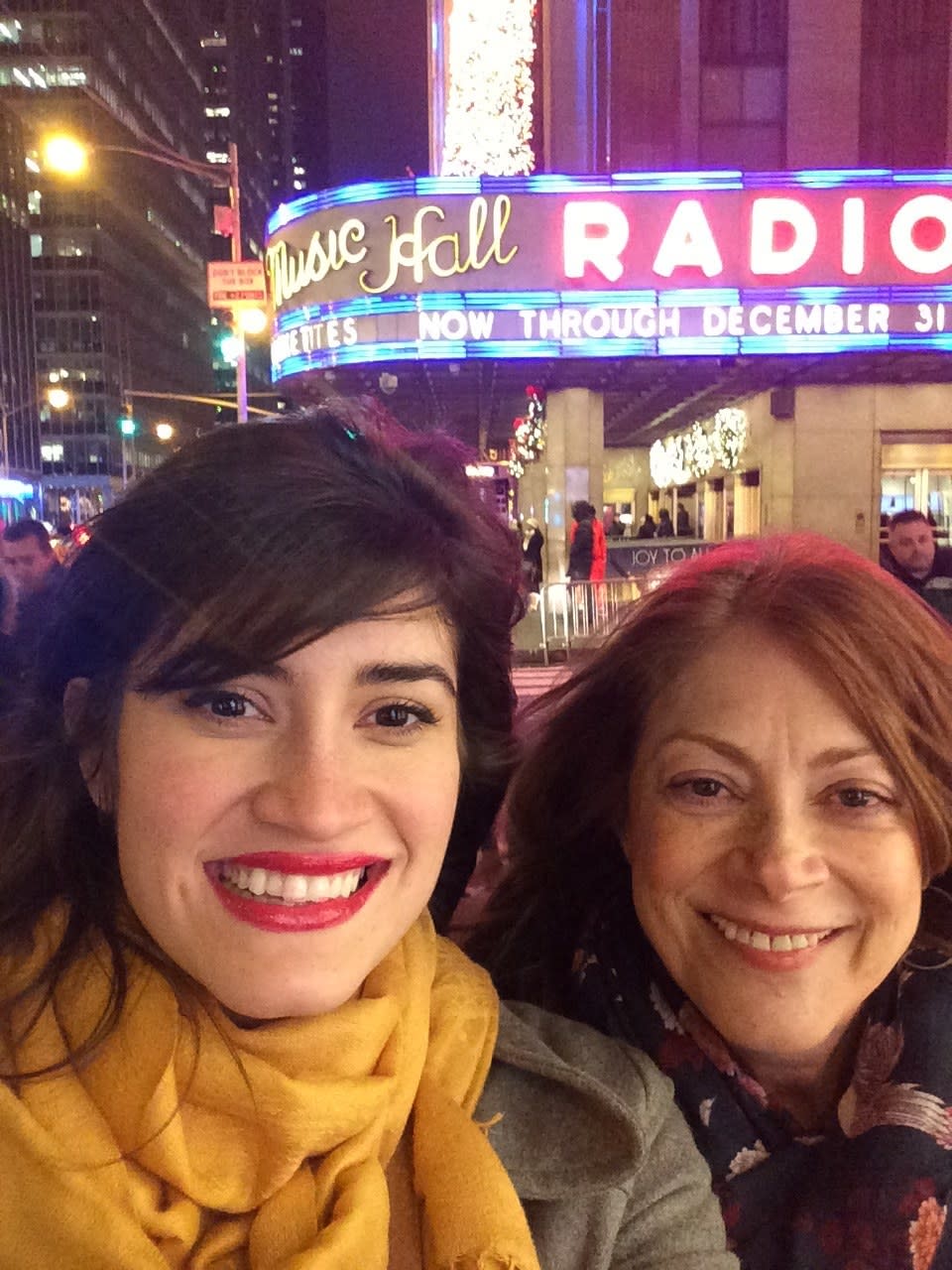22 Things No One Tells You After A Parent Or Loved One Passes Away Unexpectedly
My name is Raven, and in 2017, my mother passed away unexpectedly. She was 63 years old.
When I lost my mom at 28-years-old, I would have never guessed what it would have been like to live with grief (let alone what it would have been like to live without a mom).
But while there's no way I could have known what the next four years of my life would have been like (as grief is so different for each person), I wished there was a "grief guide" of sorts to help me have a better understanding of what I was going to experience.
So I decided to create one — a list of what someone might experience when they lose a loved one at a young age. While I hope this helps those who, unfortunately, might have recently lost someone, I also hope this helps others have a better understanding of what their grieving loved one might be going through.

Of course, it's important to mention that the below list of experiences is based on my personal relationship with grief and is not a universal explainer for everyone, especially since there are multiple ways grief can impact a person. However, I do hope that the below experiences will provide some insight on what this journey can be like for either you or a loved one you know. I also hope that this guide will make someone feel less alone, because grieving can be a lonely experience sometimes.
While these past four years have been hard without having my mom in my life, the amount of grief I have felt (and continue to feel) is just an indicator of how much I loved her — and I hope it never goes away.
So without further ado, below is my personal take on what I wish I knew grief would be like after losing my mom, from the experiences I faced to the books and movies that helped to how people provided support during the years.
Also, if this list resonates with you and you would like to provide insight or just want to connect with others who may be going through a similar life experience, please don't hesitate to comment below. While the feeling of grief will never go away, it helps to connect with others to feel less alone.
1.You may be triggered by others' stories of grief.
Once you've experienced loss, it can be tough not to put yourself in someone else's shoes who may have also lost a loved one. It's a "skill" you gain that helps you connect with others in a much deeper way. However, don't be surprised if this version of empathy triggers you. While this new skill can help you understand others' grief in a way that others may not, it can force you to superimpose yourself in their situation and cause your body to feel grief again.
For instance, when Naya Rivera passed away in 2020, I became incredibly sad and was dissociating a lot — even though I had no connection to the actress. However, it felt nearly impossible for my brain not to connect with that kind of grief and be affected by it, since it felt like a similar shocking loss to my own.
2.You’ll begin to attach meaning to items that didn’t mean anything to you before.
When my mom first passed away, I had a couple of weeks to go through her apartment and figure out what I wanted to keep, what I couldn't keep, and what I wanted to give away. And when I was trying to go through the thousands of items in her home, I realized I was keeping the things that she either touched often, loved herself, or had historical familial importance.
That ashtray she used as a coaster for her drinking glass? I kept that. The mirror in the hallway where she used to keep her keys and looked at every time before she left the house? I kept that, too. It was the simple, everyday items that helped me feel more connected to her. And now, when I see these items in my own home, I can't help but feel that she is here with me.

3.Certain physical environments, smells, or visuals will trigger random thoughts and memories.
Sometimes strong feelings of grief can come up when one of your five senses is triggered. For me, it's hard not to feel grief or miss my mom when I smell a lotion she used to use, when I'm in an area of New York that she and I once explored, or when I hear her voice after listening to one of the many voicemails she left (BTW, save all the voicemails you can).
It's just another way to interact with them even when they're no longer there. So it makes sense why you may want to deeply smell their favorite perfume, watch a movie they wholeheartedly loved, or even examine their handwriting. It will be painful at first, but eventually, the painful emotions can turn into happy ones — and soon, you will enjoy remembering the moments you had together.
4.You may experience other people projecting their hurt and grief onto you, but try not to take it personally.
Like I said before, everyone experiences grief differently. While you may feel sad or depressed, others may gravitate toward anger. And even though there is no right or wrong way to experience grief (unless it is hurting another person), sometimes people will project their hurt or grief onto you without them even realizing it. This can happen for a lot of reasons (i.e. they feel shame or guilt about the situation, they feel out of control, etc.), but no matter the reason, try not to take this personally. How they treat you in this situation says more about them than it does about you, and they are probably feeling hurt in ways they haven't been able to face just yet.
But remember: It's also completely ok to set boundaries and to communicate your needs during this time. The first couple of weeks after losing someone can be an incredibly sensitive time for family and loved ones, so take the space and set the boundaries you need to aid your mental health.
5.The first day without them will feel unbelievably surreal.
Since grief impacts people differently, I can only speak to what I experienced. But if think you'll feel similar, the first full day without your loved one will be really upsetting. Your rhythm in life will feel off; you'll have the urge to call them, but can't; and you'll search for meaning in everything that is going on.
Leaning on your support team is key during this time. Ask for help, take a breather, and be honest with yourself in everything that you have (or don't have) to do. You're only human, so be kind to yourself and don't judge yourself for how you're feeling.

6.You'll experience unbearable pain when you can’t call or text them.
I'm not going to lie, the first week (or even months) without your parent is going to be extremely hard. It's the one person you have known your entire life, so it makes sense why it feels like something is missing from your everyday life. But there's a unique (and striking) pain that occurs when you realize you can't contact them in any shape or form. It's like lighting piercing through your whole body and you can't help but feel helpless, lost, or confused.
Just know that this is completely normal. It feels surreal to be able to talk to someone one minute, and then all of a sudden, not be able to connect with them at all. Your brain will have an incredibly hard time understanding this and it will take time. Just try to be kind to yourself.
7.You’ll begin to notice the smallest ways they fit into your life, no matter how minor they were.
When someone is alive, it's natural to take the everyday interactions you have with them for granted; after all, you believe they have years left to live. However, when my mother passed away, I began to realize how often she was integrated into my life without ever realizing it before.
From the times I would text or call her after flying and landing in a new city just to let her know I made it there ok, or the times she would call or text me to remind me that it was a family member's birthday and that I should text them (thanks, mom). It was these simple memories that I no longer have in my life but am quick to remember when I'm in the middle of a familiar moment — and I wish I could have them back.
8.Every new major life experience (positive or negative) will make you wish they were there no matter how long its been since they’ve passed.
I often thought that the phrase "time will heal all wounds" meant I wouldn't be hit with grief when major life moments would happen years after my mom passed away — and boy, was I wrong. Even four years later, I am still bargaining with the universe to give my mom back so I can tell her how I got a new job, how I and my fiancé got a new apartment, or even when I get major negative news.
Usually, I don't notice this pain as grief at first (I often get it confused with general sadness), but the minute I realize what I'm feeling, I can't help but cry in that moment, wishing things were different. However, to help, I'll usually write to her in my journal to tell her about the news or how the day went. It may seem a little weird at first, but it helps to let everything out.

9.People may say the wrong thing with good intentions — and it’s just because they don’t know what to say.
Let's be honest: grief is an incredibly uncomfortable thing to talk about, especially for those who luckily haven't gotten to experience it yet. But sometimes, people or loved ones respond to hearing the death of a loved one with sayings that can be insensitive in nature, even when they don't mean for it to come off that way (i.e. "At least they're not suffering anymore" or "Things happen for a reason"). Oftentimes, it comes down to them not knowing what to say, being afraid to say the wrong thing, or not wanting to make the person sad or think of their loved one to begin with (pro tip: We're always thinking about them).
And while this is completely subjective (AKA some of these sayings won't bother you), it's important to be mindful of how some of these phrases can impact a person who lost someone they deeply loved. At the end of the day, most people truly don't want to hurt you with their condolences — but if something does bother you, it's completely ok to tell them what you would like to hear instead if you feel comfortable doing so.
10.You may feel pain when others talk about their similar loved ones.
Remember: It's completely natural to feel jealous or even envious of your friends or strangers who talk about similar loved ones who are still alive today. Even after four years, it's still incredibly hard for me to hear my friends having conversations about their moms that I can't really participate in or seeing strangers on social media discuss how they have the best mom in the world on Mother's Day.
Even though I am incredibly happy that my friends and these strangers still have moms to talk about in the present tense, I can also hold two feelings at once by feeling sad when these things come up because it makes me miss my own mom — and that's ok.
11.It will be hard to use social media on certain days — just stay off it if you can.
Talking about social media, it's best to try to stay off your accounts (especially in the first couple of years) on certain holidays that resonate with you and the loved one that passed away. Not only will this prevent you from comparing your life to others, but also for you to find other ways to connect with your loved one during this time.
For me, I unplug on Mother's Day, and sometimes Thanksgiving and Christmas, and I'll find ways to celebrate her life or be present in the moment. However, I know that some people will post about their loved one on these holidays to talk about their grief and connect with others — which is amazing! Either way, find what works best for you.

12.You may blame or shame yourself for not doing things differently.
First of all, know that it's completely normal to feel these feelings and you and no one else should criticize you for feeling them. Grief can bring up a lot (and I mean a lot) of uncomfortable emotions, from shaming yourself on how you believe you should've handled the situation or relationship to overthinking what you could have done differently. Just try to remember that thinking about the past and wishing things would've been different can't help you or the relationship you have with your loved one today — however, this will take time.
If it's financially possible, therapy is a great resource to help with feelings of shame, guilt, and hurt that sometimes can come along with grief. And don't be afraid to talk about these feelings out loud with other loved ones. Just remember: A support system should be there to help listen to your concerns, not judge or add to your worries.
13.You can be completely fine one minute, and a complete mess with grief the next.
While you may feel more intense feelings of grief in the first few years after you lose someone, the feeling of grief can subside in the later years (keyword: "can"); however, that doesn't mean your grief will be gone for good. Sometimes it means you'll be happy one second and bawling your eyes out the next.
For instance, I'll be doing something random and will come across something that will trigger a memory of my mom and I will instantly cry or be hit with grief. Even though this happens every now and then, I'm never bothered by the situation because it weirdly keeps me connected to her. These sudden moments of grief allow me to remember something of her I've completely forgotten and help to keep her memory alive.
14.You'll attach random or meaningful moments as different signs of them showing up in your life.
Since there are varying beliefs on what happens to someone after they've passed, you may find there are numerous ways your loved one will show up in the world. For instance, it's pretty common for people to associate beautiful sunsets as a sign that their loved one is saying "hi." Or, for me, I often believe my mom shows up in a form of a corgi (they're my favorite kind of breed) as a reminder that "everything is going to be ok," since I often see them when I'm feeling down or incredibly anxious about something.
But there's no right or wrong way to feel or see a loved one in your world. Maybe it's a song that always seems to pop up when you need your loved one the most or maybe you randomly found your loved one's watch as a "gift" from them. Anything goes.

15.You’ll feel alone and believe that no one will understand your pain, especially after the first few months.
Even though you may have support in imaginable ways, it can still be incredibly lonely to experience grief — and this is especially true after the three-month mark when people tend to stop reaching out to check in on you. It's the part in time when people go back and act like everything is normal when this "new normal" hasn't even begun for you yet. It's important to mention that this doesn't mean they don't love you or care about your grief, but it can feel lonely when people stop reaching out and you have to find alternative ways to cope or talk about the person.
Just remember that it's more than ok to bring up your grief to others whenever you need support. Grieving can feel lonesome sometimes, especially if you lost someone at a young age when your support group might not fully understand the scope of the grief you are experiencing, but that doesn't mean you are alone.
16.People may ask intrusive questions — and just know that you don’t have to answer them.
While this certainly depends on one's family or loved ones' dynamics, you may experience people asking intrusive questions about the death of your loved one. Just know there is no question you HAVE to answer. If you feel uncomfortable talking about something or simply just don't have the mental bandwidth to answer, you don't have to.
People tend to be generally curious about how and why someone has passed away, and even if there may be no ill intentions behind this curiosity doesn't mean you have to answer. Instead, you can switch topics, clearly state you don't feel comfortable discussing, or keep the answer very short if you wish.
17.Support can show up in ways you'd never imagined.
When a loved one passes away, it can feel like the floor has crumbled underneath you, and it can feel nearly impossible to do anything "normal." Luckily, support can show up in ways you'd never imagine. For me, I was incredibly lucky for my fiancé's mother to fly up to help. My friends gifted me an Uber Eats gift card so I didn't have to worry about cooking, and other loved ones provided a safe space to let me vent or talk. Yes, grief can feel lonesome in some ways, but in others, you'll feel supported more than ever.
And when it comes to supporting people who are grieving, just try to think of what will make their lives easier in that moment — but, honestly, anything will do. From sending a thoughtful handwritten card to even making your favorite dish and bringing it to their house. The truth is, at this time, people who are grieving don't really have the mental capacity to ask for help or to even think about if they have enough toilet paper in their home. The mundane everyday things tend to go out the window because it can sometimes feel like they're just trying to survive.

18.The first year will hit you hard, but the second year may hit you even harder.
Without a doubt, the first year without your loved one, especially if they were your parent, can be challenging. It will be the first time they won't be there for the holidays, call you for your birthday, or talk to you about their favorite TV show. However, there's something to be said about the second year that sometimes feels just as painful — and it's because life begins to feel like it's going back to normal without them.
Since grief impacts people so differently, some people may view the second year in a different way; however, for me, I started to realize what life would be like without having my grief as crutches to hold me up. The grief I felt in the first year allowed me to stay connected with my mom whereas life was completely back to normal during the second even though I was feeling the same amount of grief. It's a weird transitional time, so take things slow and understand life may feel a little imbalanced and that's ok.
19.You may have to explain your pain to others who may not understand.
If you've lost someone at a young age, it can be hard for others your age to understand what you're going through, especially if they have (luckily) never lost someone themselves. What this means is that sometimes, you may have to explain (only if you want to!) your relationship with grief, how it makes you feel, and what can trigger it.
When I did this with my fiancé or friends, it helped them build a deeper understanding of what I was going through and how they could support me. However, do whatever you feel works best for you! Again, there is no right or wrong way to grieve.
20.Your “idea” of what life is supposed to be may shift.
One of the weirdest things that happens after losing a loved one is having your whole perspective on life shift. What felt like a huge problem in your life now feels like nothing in comparison to the loss you just experienced. This life event may even alter how you view your career, your friendships, or the way you want to live your life in general.
Just know that this is completely normal. Grief can have you re-evaluating every aspect of your life and what is and isn't important. Take your time with this new perspective to see how you want to move forward.

21.You may find comfort in websites, movies, podcasts, or books that will help you understand your grief.
Since grief can feel lonely or overwhelming sometimes, you may begin to search for stories about grief to help you feel less alone. Luckily, there are a lot of books, TV shows, movies, and podcasts that can help you connect with your grief.
For instance, I loved watching Never Have I Ever, Fleabag, and Coco. I also recently bought Crying in H Mart to read and also have Option B on my read list. But if you're looking for more audio options, Terrible, Thanks for Asking, Unlocking Us, Dead Parent Club, are great to listen to as well.
